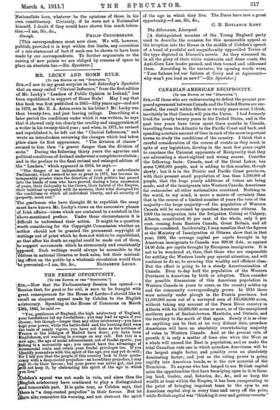THE PEERS' OPPORTUNITY.
_ [To TER EDITOR OF THZ " SPECUTOR.1 t,SIR,—Now that the Parliamentary Session has opened — a 'Session that, for good or for evil, is sure to be fraught with
great consequences for the House of Lords—I should like to 'recall an eloquent appeal made by Cobden to the English aristocracy. Speaking in. the House of Commons on March 13th, 1845, he said :--
"You, gentlemen of England, the high aristocracy of England, your forefathers led my forefathers ; you may lead us again if you , choose ; but though—longer than any other aristocracy—you have • kept your power, while the battle-field and the hunting-field were the tests of manly vigour, you have not done as the noblesse of 'France or the hidalgos of Madrid have done; you have been 'Englishmen, not wanting in courage on any call. But this is a , new age; the age of social advancement, not of feudal sporta; you ',along to a mercantile age ; you cannot have the advantage of commercial rents and retain your feudal privileges too. If you ,14entify yourselves with the spirit of the age, you may yet do well ; for I tell you that the people of this country look to their aristo- cracy with a deep-rooted prejudice—an hereditary prejudice, I may [g
it—in their favour; but your power was never got, and you
• not keep it, by obstructing the spirit of the age in which ou live."
obden's appeal was not made in vain, and since then the lish aristocracy have continued to play a distinguished d honourable part. It is quite true, as Cobden says, that
there is "a deep-rooted prejudice" in their favour. But let Lm also remember his warning, and not obstruct the spirit [A distinguished member of the Young England party used to describe the occasion for this memorable appeal as the irruption into the House in the middle of Cobden's speech of a band of youthful and magnificently apparelled Tories of the type depicted in Disraeli's novels. As they streamed in, in all the glory of their white waistcoats and dress coats, the Anti-Corn Law leader paused, and then turned and addressed them. According to the narrator, his opening words were, "Your fathers led our fathers at Crecy and at Agincourt— why won't you lead us now ? "—ED. Spectator.]










































 Previous page
Previous page